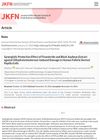October 2023 in “Applied sciences” Iris germanica rhizome-derived exosomes help protect skin cells from oxidative stress and aging.
 45 citations,
January 2020 in “International Journal of Molecular Sciences”
45 citations,
January 2020 in “International Journal of Molecular Sciences” Some natural compounds may help overcome drug resistance in certain cancers, but more research is needed.
 25 citations,
September 2013 in “Journal of thoracic oncology”
25 citations,
September 2013 in “Journal of thoracic oncology” Soy isoflavones can protect lung tissue from radiation damage.
 14 citations,
December 2011 in “Archives of Dermatological Research”
14 citations,
December 2011 in “Archives of Dermatological Research” Phyto-vesicles of β-sitosterol may effectively treat hair loss.

Plant-based compounds can improve wound dressings and skin medication delivery.
1 citations,
May 2024 in “Applied Sciences” Cordyceps militaris is a promising, cost-effective medicinal fungus with health benefits and efficient production methods.
 22 citations,
October 2019 in “International Journal of Nanomedicine”
22 citations,
October 2019 in “International Journal of Nanomedicine” The nanoparticles improved hair growth and enlarged hair bulbs.
 January 2025 in “AAPS PharmSciTech”
January 2025 in “AAPS PharmSciTech” Transethosomes improve drug delivery through the skin and show promise for treating various conditions.
 July 2023 in “Journal of Cosmetic Dermatology”
July 2023 in “Journal of Cosmetic Dermatology” Ethosomes could improve how well skin treatments work, but more research is needed on their safety and stability.
 June 2015 in “Journal of the turkish academy of dermatology”
June 2015 in “Journal of the turkish academy of dermatology” Eating the right foods is important for skin health and can help treat some skin conditions.
 98 citations,
October 2012 in “Dermatologic Clinics”
98 citations,
October 2012 in “Dermatologic Clinics” Eating the right nutrients can improve hair health, but taking extra supplements usually doesn't help unless you have a deficiency.
 December 2024 in “Nutrients”
December 2024 in “Nutrients” Skin, hair, and nail changes can help detect eating disorders early.
 16 citations,
November 2021 in “Antioxidants”
16 citations,
November 2021 in “Antioxidants” Managing oxidative stress might help treat low testosterone and related chronic diseases in aging men.
 January 2020 in “Asian journal of applied science and technology”
January 2020 in “Asian journal of applied science and technology” Good nutrition is crucial for health and preventing disease, and supplements can help prevent nutrient deficiencies.
 112 citations,
May 2019 in “Pharmacological Research”
112 citations,
May 2019 in “Pharmacological Research” Lignans and neolignans from plants may help protect against various health issues, including cancer and heart disease.
 3 citations,
January 2017 in “Revista chilena de nutrición”
3 citations,
January 2017 in “Revista chilena de nutrición” Certain natural compounds called terpenes may help prevent prostate cancer.
 12 citations,
September 2022 in “Foods”
12 citations,
September 2022 in “Foods” Some nutraceuticals may help in COVID-19 prevention and treatment, but more research is needed.
4 citations,
December 2020 in “Current sports medicine reports” Athletes usually get enough vitamins and minerals from a healthy diet, and supplements are only needed for those with actual deficiencies.
23 citations,
December 2001 in “Experimental dermatology” Soymilk can slow hair growth and make hair thinner.
 4 citations,
April 2022 in “International Journal of Biological Macromolecules”
4 citations,
April 2022 in “International Journal of Biological Macromolecules” The mix of bacterial cellulose and soybean protein helps wounds heal faster, regrow hair, and reduces scarring and inflammation.
223 citations,
January 2000 in “BioFactors” Food-derived peptides may help prevent diseases like high blood pressure and high cholesterol, and can support the immune system.
2 citations,
April 2011 in “InTech eBooks” Non-denatured soybean extracts provide multiple anti-aging skin benefits.
43 citations,
December 2017 in “BMC Plant Biology” GmMAX3b gene in soybeans boosts nodulation and affects hormone levels.
2 citations,
October 2008 in “InTech eBooks” Non-denatured soybean extracts are effective for skin care, offering skin lightening, anti-aging, and UV protection benefits.
297 citations,
December 2005 in “Journal of controlled release” P-SLN nanoparticles effectively deliver podophyllotoxin to the skin.
 July 2024 in “Journal of Integrative Plant Biology”
July 2024 in “Journal of Integrative Plant Biology” Soybean root hair growth under low phosphate relies on specific transporters and transcription factors.
 January 2025 in “Journal of the Korean Society of Food Science and Nutrition”
January 2025 in “Journal of the Korean Society of Food Science and Nutrition” Combining finasteride and black soybean extract better protects hair cells from damage and may treat hair loss effectively with fewer side effects.
 March 2024 in “Journal of animal science/Journal of animal science ... and ASAS reference compendium”
March 2024 in “Journal of animal science/Journal of animal science ... and ASAS reference compendium” Soy hull supplementation did not affect sheep gastrointestinal parasite infection compared to corn-based supplements.
 13 citations,
December 2011 in “Korean Journal of Food Science and Technology”
13 citations,
December 2011 in “Korean Journal of Food Science and Technology” Black soybean extract helps promote hair growth and could prevent hair loss.
1 citations,
February 2023 in “Animals”



















